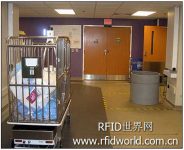
RFID technology helps hospitals detect expensive probes mixed in discarded items
[ad_1]
Quite a few hospitals now use active RFID technology to locate and manage portable X-ray machines and other equipment. The University Medical Center of the Greenville Hospital System is no exception. But the difference is that this North Carolina medical institution, which includes five hospitals, has added one more feature: Greenville’s RFID party also uses passive EPC Gen 2 RFID tags to identify expensive surgical probes to prevent them from being thrown away by mistake. Into the trash can. The center will soon apply labels to more than 5,000 pieces of medical equipment, such as infusion mercury.
The center uses this RFID solution in the surgical department of the 750-bed three-level Greenville Memorial Hospital. The system includes Wi-Fi active tags and EPC Gen 2 passive tags, and Cisco Wi-Fi networks (currently only distributed in operating rooms, It will be extended to the entire hospital in the future), ThingMagic’s EPC Gen 2 Mercury5 and Astra RFID readers, and Industrial Portals’ RFID portals.
The flexibility of this solution allows hospitals to use multiple types of tags, including small passive RFID tags for surgical probes, each worth several thousand dollars. Due to the small size of the probe, it is sometimes inadvertently mixed into dirty linen cloth and other discarded items during the operation. “We decided to install active RFID to track high-cost medical equipment in 30 operating rooms equipped with Wi-Fi networks,” said John Mateka, Executive Director of Materials Services at Greenville Hospital System. “At the same time, we also want to track those small devices. We don’t care much about the location of these devices, but we want to know if they were accidentally thrown into the trash can.”
In the surgery department, the cart pushes all the used disposables and the dirty linen away from the surgery department and moves them to the biochemical and standard trash bins or the dirty linen storage area. System integrator and RFID solution provider Integrated Business Systems and Services (IBSS) cooperated with hospitals to install RFID portals in the aisles where carts pass.
Now, if a cart with a labeled surgical probe passes through this doorway, and the embedded Mercury5 reader detects the tag, it will trigger an alarm, prompting employees to push the cart aside instead of moving on. At the same time, the reader sends the obtained label data to the IBSS SynTrack software through the Wi-Fi network, and the latter automatically sends an email to notify the relevant personnel.

If a cart with a labeled surgical probe passes through this doorway and the embedded Mercury5 reader detects the tag, an alarm will be triggered
The RFID portal installed 6 months ago paid off its investment two weeks ago: for the first time, the reader detected a probe worth $17,000 in a cart full of dirt. “In the operating room, we use a lot of linen and plastic bedding, and there are also a lot of discarded items after the operation. In fact, most items, except for equipment, are disposable. This is after installing this system The first alarm we received, we are very happy that this system has worked so that we don’t throw equipment by mistake.”
For safety reasons, the hospital hopes to increase the number of equipment labels. Although metal detectors can detect most equipment, RFID portal ports can be used as a backup and play a supplementary role. However, at present, labels cannot withstand high-temperature disinfection, so only probes and devices that can be cleaned with labels can be used. “Our current applications are restricted. Although we know that some labels on the market can withstand steam detoxification, we still need to learn more about them.”
In addition, hospitals also use passive tags to track a variety of mobile medical devices, such as infusion mercury. The hospital chooses not to use more expensive Wi-Fi active tags that can track location in real time; instead, it uses fixed passive readers in storage areas, specific floors or departments, and judges whether the tag is at the location of the last read of the tag In a certain area.
Moreover, the hospital also plans to use tracking data and reporting tools provided by SynTrack. “The system can prevent the probe from entering the trash can, which is very good. We can also backtrack to see the cause of the accident, involving the staff and procedures, so that we can prevent the incident from happening again.” Mateka said.
[ad_2]



